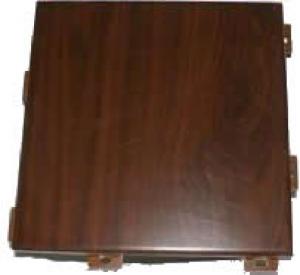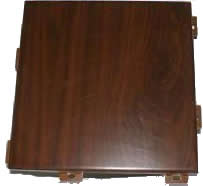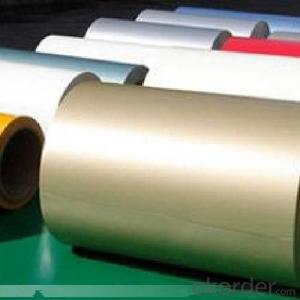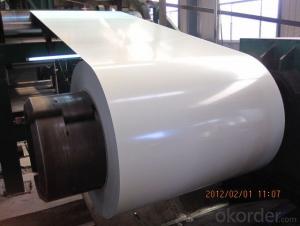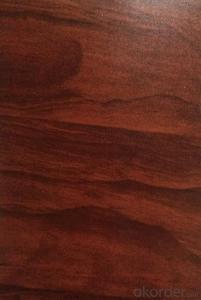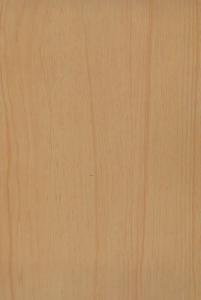Copper Aluminum Coil Wooden Grain Coating Aluminum Sheet
- Loading Port:
- China Main Port
- Payment Terms:
- TT OR LC
- Min Order Qty:
- -
- Supply Capability:
- -
OKorder Service Pledge
OKorder Financial Service
You Might Also Like
Wooden grain coating aluminum sheet
Specifications
1. no color difference
2.anticorrosion
3.high wearability
4.good formability
Alloy | AA1100/AA1050/1050A/AA1060/AA1070/AA3003/AA3104/AA3105/ AA5052/AA5005/AA5083/AA6061/AA7075/AA8011 |
Temper | HO,H12,H14,H16,H18,H19,H22,H24,H26,H28,F,H112,etc |
Arts | DC or CC |
Coating finish | PVDF & PE |
Paint brands | PPG,SHELL, WHISPER,LILY,ETC. |
Thickness of paint | 5micron-25micron |
Application | ACP,aluminum honeycomb plate,ceiling,roof,aluminum curtain wall,roller shutter door,garages door,furniture,clectronic industry and etc. |
Color | According to RAL color code or the samples provided. |
Certificate | meet GB/ASTM/EN standards, pass ISO9001:2008 quality management system certification and SGS certification. |
Payment terms | 30% T/T in advance as deposit,70% balance against the B/L copy or 100% irrevocable L/C at sight |
Remark | details can be discussed further. |
- Q: How are aluminum coils processed for specific surface finishes?
- Aluminum coils are processed for specific surface finishes through various methods such as mechanical polishing, chemical etching, anodizing, or coating. These processes help achieve desired appearances, textures, and protective coatings on the aluminum surface.
- Q: How are aluminum coils used in the production of automotive heat shields?
- The production of automotive heat shields heavily relies on aluminum coils. These shields are vital in safeguarding different parts from excessive heat produced by the engine, exhaust system, or other heat sources. Typically, these shields are made from lightweight and heat-resistant materials, making aluminum coils a popular choice because of their exceptional thermal conductivity, durability, and corrosion resistance. To manufacture the heat shields, aluminum coils undergo a process of unwinding and cutting into sheets of the desired size. These sheets are then shaped using various techniques like stamping, bending, or deep drawing. Aluminum's malleability makes it perfect for creating heat shields with intricate geometries, ensuring a precise fit in the vehicle. Once the desired shape is achieved, the aluminum sheets are often treated with a surface coating to improve heat resistance and prevent corrosion. This coating can be in the form of a ceramic or metallic layer, serving as an additional barrier against extreme temperatures. Furthermore, the formed and coated aluminum sheets are usually combined with other insulating materials, such as ceramic fibers or laminated films, to further enhance the heat shield's performance. These additional layers aid in reducing heat transfer by reflecting or absorbing the heat energy, thus protecting surrounding components from potential damage or overheating. Finally, the assembled heat shields are affixed in specific locations within the vehicle, such as around the exhaust system or near the engine, using fasteners or adhesive techniques. The lightweight nature of aluminum coils ensures that the heat shields do not add unnecessary weight to the vehicle, which is crucial for maintaining fuel efficiency and overall performance. In conclusion, aluminum coils are extensively employed in the production of automotive heat shields due to their excellent thermal conductivity, durability, and corrosion resistance. Their ease of shaping and molding, coupled with surface coatings and additional insulating layers, guarantee effective heat insulation and protection for various vehicle components.
- Q: Are aluminum coils suitable for construction purposes?
- <p>Yes, aluminum coils can be used for construction. They are valued for their lightweight, corrosion resistance, and high strength-to-weight ratio, making them ideal for applications such as roofing, facades, and structural components. Aluminum's malleability allows for easy shaping and forming, which is beneficial in various construction projects. It's also sustainable due to its recyclability, reducing environmental impact.</p>
- Q: Can aluminum coils be used for HVAC condenser coils?
- Yes, aluminum coils can be used for HVAC condenser coils. Aluminum is a popular choice for condenser coils due to its excellent heat transfer properties, durability, and resistance to corrosion. Additionally, aluminum coils are lightweight, making them easier to install and transport.
- Q: This question asks for a brief explanation of the process involved in the manufacturing of aluminum coils.
- <p>Aluminum coil is made through a series of processes starting with the melting of aluminum ingots or scrap. The molten aluminum is then poured into a casting machine where it's cooled and solidified into large slabs. These slabs are then heated and passed through a series of rolling mills to reduce their thickness and achieve the desired coil gauge. The rolling process is often hot or cold, depending on the final application of the coil. After rolling, the aluminum is coiled into rolls and may undergo additional treatments like annealing to improve its properties. Finally, the aluminum coil is cleaned, inspected, and shipped for use in various industries such as construction, automotive, and packaging.</p>
- Q: What are the typical production volumes for aluminum coil manufacturers?
- Aluminum coil manufacturers' production volumes can vary depending on factors like the size of the manufacturer, market demand, and production capacity. Generally, these manufacturers produce large quantities of coils to meet the needs of different industries. Some manufacturers produce a few hundred tons of aluminum coils per month, while others with larger production capacities can produce thousands of tons. The specific requirements of customers also influence production volumes, as manufacturers customize their production to meet customers' demands. Industries like construction, automotive, packaging, and aerospace have high demand for aluminum coils, leading to increased production volumes. Manufacturers can also produce various sizes and thicknesses of aluminum coils, further expanding their production volumes to cater to diverse market needs. It is important to consider that production volumes for aluminum coil manufacturers can fluctuate based on market conditions, economic factors, and industry trends. Manufacturers continually work towards optimizing their production processes and capacities to efficiently meet demand while maintaining high-quality standards.
- Q: I know this question is not so bright, but I am very curious why do we recycle aluminum cans? Is it that they are not biodegradable?
- We recycle cans as to save energy (and money) as the processing of aluminum cans from raw materials is very energy intensive, thus remelting them down and processing new aluminum products reduces energy use.
- Q: How are aluminum coils protected from corrosion?
- Aluminum coils are protected from corrosion through various methods, including the application of protective coatings such as paint or anodizing, using corrosion-resistant alloys, and applying a layer of zinc through a process called galvanizing. These protective measures create a barrier between the aluminum surface and external elements, preventing corrosion and extending the lifespan of the coils.
- Q: What are the various classifications of aluminum coil grades?
- <p>Aluminum coils are classified into different grades based on their composition and properties. The most common grades include 1000 series (99% pure aluminum), 3000 series (aluminum-manganese alloys), 5000 series (aluminum-magnesium alloys), and 6000 series (aluminum-silico-magnesium alloys). Each series has specific characteristics, such as corrosion resistance, formability, and strength, which determine their suitability for various applications like construction, transportation, and packaging. Additionally, there are 2000 series (aluminum-copper alloys), 4000 series (aluminum-silicon alloys), 7000 series (aluminum-zinc-magnesium alloys), and 8000 series (other alloys), each with unique properties and applications.</p>
- Q: How can aluminium ingots be processed into aluminium coils (aluminium sheets)?
- Make the blank first, then roll on the mill.
Send your message to us
Copper Aluminum Coil Wooden Grain Coating Aluminum Sheet
- Loading Port:
- China Main Port
- Payment Terms:
- TT OR LC
- Min Order Qty:
- -
- Supply Capability:
- -
OKorder Service Pledge
OKorder Financial Service
Similar products
Hot products
Hot Searches
Related keywords
